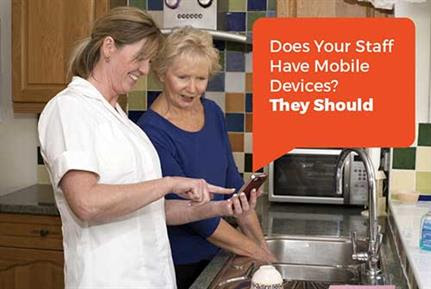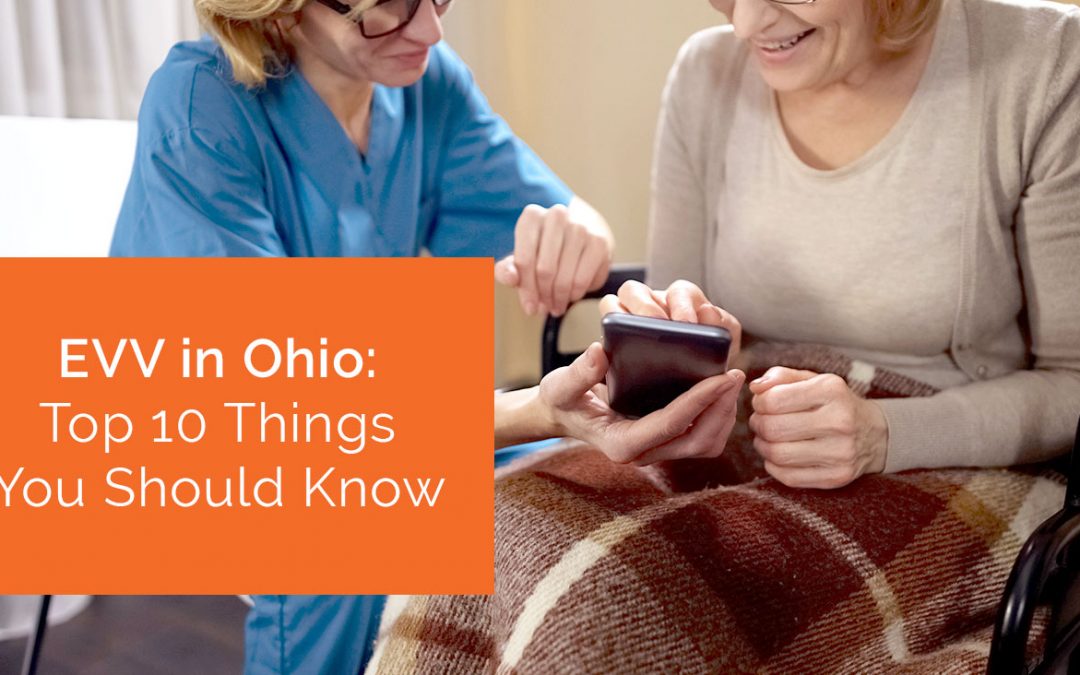If you were to ask your staff, “Who has a smartphone?” there is a good chance that most — if not all — of your caregivers will report having one of the devices. They have become an integral part of our daily lives, as evidenced by the fact that 64 percent of American adults now own a smartphone, and a majority of them report being heavily dependent on their phones.
Even if your staff has smartphones, though, the question is whether they are using them, or company-issued mobile devices, for their work. The fact is, most agencies aren’t taking advantage of mobile devices to streamline operations yet. Concerns about cost, security, and how to best leverage devices in the home have kept many agencies from providing their staff with phones, but that’s all about to change: According to one study, smartphones will have penetrated 95 percent of the home health sector by 2020, and the number of patients worldwide using some form of home health technology will increase to 78.5 million by 2020, which is almost double the number of patients using the technology in 2014.
The growth of mobile device usage in home health care is due in large part to several important benefits to the delivery of home health care services. If you have not yet supplied your team with mobile devices, here are some good reasons to do so.
Streamlined Scheduling
With a mobile-optimized software product, it becomes easier to schedule providers. For example, some options will plan routes to minimize drive times, or automatically reschedule or change appointments, ensuring that providers are always in the right place at the right time.
Streamlined Payroll
In addition to making scheduling easier and more functional, mobile solutions allow employees to clock in and out remotely, reducing paperwork burdens for timekeeping and payroll.
Improved Reporting Accuracy
Many reporting errors occur when written records are transcribed to electronic records — not to mention, such activities add an unnecessary administrative burden to your caregivers. When you provide mobile devices, reporting can take place in real time, and will be more accurate and thorough, reducing the likelihood of billing errors. Also, electronic data entry also aids in better reporting, helping agencies comply with regulations and easily identify areas for improvement while also receiving reimbursements more quickly. Not to mention, a simple mobile solution allows your caregivers more time to focus on the client, rather than filling out paperwork.
Improved Communication Between Providers, Patients, and Families
Using a mobile device with an advanced software program helps open the lines of communication between caregivers and their clients and families. Secure messaging portals allow everyone to leave messages with each other, share reports, and ask questions, ensuring that information is shared in a timely manner. A mobile solution eliminates the need for leaving written notes or messages — and is, for most people, a form of communication that they are comfortable with.
Improved Compliance
Several states now require electronic verification of visits from home health providers, usually via a phone call. A mobile device makes this process easier and more streamlined, while also offering the option of GPS verification to provide service claims proof-of-care data.
Improved Safety
It cannot go unacknowledged that providing home health does involve a certain amount of risk. Providing mobile devices ensures that your staff can call for help when necessary, and that you can monitor their whereabouts.
Drawbacks to Providing Mobile Solutions
While providing your staff with mobile devices does offer some benefits, there are also some drawbacks to consider. Most of these can be overcome with the right tools and training, but they cannot be overlooked.
1. Security. Mobile security is a major issue in all sectors, but it’s particularly concerning in health care, where you are dealing with protected health information. Choosing a solution that is optimized for mobile security, and establishing effective BYOD and device management policies is vital to a successful mobile program.
2. Potential for Lost or Misplaced Devices. One of the key issues in any mobile device program is managing lost or stolen devices. An important part of any security protocol is developing a mobile device management program that addresses lost and stolen devices, and implements a procedure for handling such cases.
3. Battery Life. Mobile devices have limited battery life, and it’s very likely that they will run out of battery before the typical shift ends. Choosing a software solution that limits battery usage, and providing additional charging tools (battery packs, etc.) to ensure that devices remain operational is important to a successful program.
4. Cost. Even with BYOD, there are costs associated with providing mobile devices. However, evaluating the cost savings possible by using mobile solutions may prove that the ROI is greater than expected.
Mobile devices have become a part of our everyday lives, both at work and at play. While there are some risks, the benefits of providing mobile devices to your staff far outweigh them — and can improve your business. To learn more about software that will help your agency go mobile, click here to see Complia Health’s family of advanced products.




